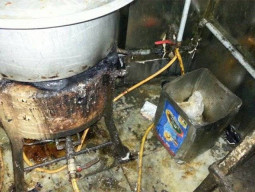
Valerie Amos, the new UN Under-Secretary General for Humanitarian Affairs and Emergency Relief Coordinator, dabs her forehead but keeps asking questions in a camp she is visiting, while the rest of her entourage drips with sweat. Families are getting dry food rations for two weeks.
“But is it enough for the family?” she asks a district official. When she fails to get a direct answer, she asks: “Does it last?” A UN staffer asks a beneficiary the question in Sindhi. It seems the rations only last a week and Amos assures the beneficiary that they will try to address the issue, reports IRIN, the UN information unit.
A district official says he is overwhelmed. Amos sympathizes and offers support. He complains that the administration has received only a fraction of the money it needs. She suggests his administration is just one of many in need across the country. It’s September 9, Amos’s first day on the job as the head of the Office for the Coordination of Humanitarian Affairs (OCHA) and the UN’s top humanitarian official and this is one of the world’s biggest humanitarian disasters. Did she feel she had been thrown into the deep end?
“I don’t feel overwhelmed,” she said. Dealing with disasters is in the job description. She is here officially to boost the morale of the humanitarian community responding to the floods, to assess the response and help fill the gaps. She admits that nothing quite prepares you for the scale of the disaster. The World Food Program (WFP) chopper landing on the bit of land spared by the Indus River in Haibat Bund brings all those TV images of the floods in Pakistan alive. The sea and the river seem to have merged to consume most of Sindh. The field trip is exhausting work.
Amos takes time out for interviews with major news channels. A correspondent for a foreign radio station asks her some personal questions and the discussion takes on a surreal air as Amos - against a backdrop of miles of flooded villages - shares with viewers that she likes dancing, loves Italian food, and has to find a place to live in New York.
She tackles criticism that response to the catastrophe is slow by explaining that it has been difficult to keep up with the constantly rising numbers, but “we also need to scale up our capacity”. On funding, donors are mindful of the complexity of the crisis, and provinces are dealing with various stages in the disaster: parts of the country are still in the emergency relief stage, while other areas are in the early recovery phase.
Amos notes that the financial response could be further stimulated if the problems around access, capacity and the stages of the disaster were communicated more effectively. When the revised appeal for funding humanitarian operations in Pakistan is launched next week it will focus on recovery. Amos, fresh from the field, will be consulting with her UN colleagues in New York to consider the strategies that can deliver in the face of destruction on such a scale.
The chopper takes Amos back to Sukkur. After a brief break she is driven to two camps supported by UN and other relief agencies. There are more questions and more meetings as the day gets even hotter.
Published in The Express Tribune, September 14th, 2010.

















COMMENTS
Comments are moderated and generally will be posted if they are on-topic and not abusive.
For more information, please see our Comments FAQ